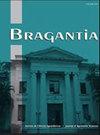Soil metal concentrations after five years of pasture-tosugarcane conversion
IF 1.5
4区 农林科学
Q2 AGRICULTURE, MULTIDISCIPLINARY
引用次数: 1
Abstract
: Extensive pastures are commonly converted to sugarcane areas in Brazil. In soils cultivated with sugarcane, tillage and fertilization are management practices commonly carried out. Soil management practices alter the physical and chemical properties increasing or decreasing metal availability. The purpose of this study was to quantify soil metal concentrations during pasture-to-sugarcane conversion correlating these changes with physical and chemical properties. The results showed that the concentration of metals in soil samples occurred according to the following order Fe > Mn > Cr > Zn > Cu > Pb > Cd. Significant increases in soil metal concentrations due the sugarcane cultivation were observed to Cd and Cu. The soil physical and chemical properties presented correlations with soil metal concentrations. There was a strong relationship on inorganic fertilization to change in soil metal concentrations. The principal component analysis (PCA) explained 55.4% of the total data variance, separating factors in two groups that pointed to an influence of fertilization on metal grouping. Inorganic fertilizer application may input 1.06 g·ha –1 ·year –1 Cd. The Cd concentration ranged from 0.15 to 1.07 mg·kg –1 , representing addictions of 9.54 mg·ha –1 ·year –1 Cd in soil. The metal concentrations observed after five years of pasture-to-sugarcane conversion did not represent environmental risks since the concentrations remained below the Brazilian official determinations.牧场转为甘蔗后5年土壤金属浓度
在巴西,广阔的牧场通常被改造成甘蔗种植区。在种植甘蔗的土壤中,耕作和施肥是常用的管理方法。土壤管理措施改变了土壤的物理和化学性质,增加或减少了金属的可利用性。本研究的目的是量化在牧场到甘蔗转化过程中土壤金属浓度的变化与物理和化学性质的关系。结果表明,土壤样品中金属元素的富集顺序为Fe > Mn > Cr > Zn > Cu > Pb > Cd。土壤理化性质与土壤金属浓度呈相关性。土壤金属含量的变化与无机施肥有密切关系。主成分分析(PCA)解释了55.4%的总数据方差,分离了两组表明施肥对金属分组影响的因素。施用无机肥料可输入1.06 g·ha -1·年-1 Cd, Cd浓度范围为0.15 ~ 1.07 mg·kg -1,表明土壤中镉的成瘾量为9.54 mg·ha -1·年-1 Cd。经过五年的牧场转化为甘蔗后所观察到的金属浓度并不代表环境风险,因为其浓度仍低于巴西官方确定的水平。
本文章由计算机程序翻译,如有差异,请以英文原文为准。
求助全文
约1分钟内获得全文
求助全文
来源期刊

Bragantia
AGRICULTURE, MULTIDISCIPLINARY-
CiteScore
2.40
自引率
8.30%
发文量
33
审稿时长
4 weeks
期刊介绍:
Bragantia é uma revista de ciências agronômicas editada pelo Instituto Agronômico da Agência Paulista de Tecnologia dos Agronegócios, da Secretaria de Agricultura e Abastecimento do Estado de São Paulo, com o objetivo de publicar trabalhos científicos originais que contribuam para o desenvolvimento das ciências agronômicas.
A revista é publicada desde 1941, tornando-se semestral em 1984, quadrimestral em 2001 e trimestral em 2005.
É filiada à Associação Brasileira de Editores Científicos (ABEC).
 求助内容:
求助内容: 应助结果提醒方式:
应助结果提醒方式:


